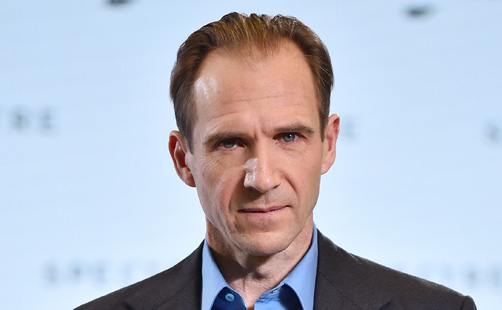
- Golden Globe Awards
Ralph Fiennes (The Grand Budapest Hotel)
It’s in his eyes. Whether he’s playing baddies like the Nazi commandant in his first major Hollywood movie, Schindler’s List, the depraved psychopath in Red Dragon or the fearsome Lord Voldemort in the Harry Potter movies; or romantic leading men like the burn victim swathed in bandages in The English Patient, or the star-crossed lover in The End of the Affair, the weight of that magnetic grey-green gaze has caused his on-screen adversaries to cower, his on-screen lovers to swoon, and audiences everywhere to realize that Ralph Fiennes dominates the screen and can do anything.
As he shows this year in his comic turn, something he’s not known for, in the Globe-nominated role of M. Gustave in Wes Anderson’s antic The Grand Budapest Hotel. Fashioned after the Ernst Lubitsch comedies, the part was written especially for him by Anderson. He received the script “and then for a second it seemed that the film wasn’t going to happen or maybe someone else is going to do it, and then it went quiet. And then Wes contacted me very assertively and said, I want you to play Gustave. Are you going to do it? So I said, yes of course.” Playing a concierge in an elegant hotel who is the image of courtliness and refinement one moment and blissfully profane the next wasn’t without its challenges and the two worked especially hard on capturing the tone. “It’s a part that can easily become a little bit too affected, a little bit too campy, too flamboyant, and Wes seemed to like it when it was a little bit underplayed, more throwaway.” Delivery of the lines was important as well for the comedic style “which demands a speed of delivery that’s not really naturalistic at all. The comedic effect has often to do with the rhythms and the speed of the speech.”
Born in Ipswich, England, Ralph Nathaniel Twisleton-Wykeham-Fiennes originally wanted to become a painter, but quickly realized his true passion and enrolled in RADA. Since making his stage debut in 1986, he went on to act in several small projects on stage and screen till the decade of the 90s where he received worldwide attention and shone, winning a Tony award for his Hamlet in 1995, an Oscar nomination for Schindler, and rave reviews for his performances in The English Patient, Quiz Show, The End of the Affair, Oscar and Lucinda and Sunshine. The 2000s brought us Red Dragon, Spider, The Constant Gardener and his recurring appearances in the Harry Potter series. Other outstanding roles at the time included the Globe-nominated Duke of Devonshire opposite Keira Knightley in The Duchess, and the Emmy-nominated Bernard, the butler of tobacco heiress Doris Duke in HBO’s Bernard and Doris opposite Susan Sarandon. These were followed by roles in the Globe and Oscar nominees The Reader and The Hurt Locker.
Periodic appearances onstage continued with David Hare’s Ivanov in 1997, the double act of Richard II and Coriolanus in 2000, Christopher Hampton’s The Talking Cure in 2002 and the RSC’s Brand by Ibsen that same year. Fiennes also embarked on a directing career with the well-received Coriolanus in 2011 followed by The Invisible Woman in 2013, equally a critical triumph though not widely seen.
Four times nominated for a Golden Globe, twice nominated for an Oscar, Fiennes will be Judi Dench’s replacement as M, the head of MI6, in the James Bond films. The next one, Spectre, is to be released in November 2015 with Daniel Craig returning as Bond and Sam Mendes directing again.
Involved with UNICEF since 1999, Fiennes was appointed a UK ambassador in 2001, and has visited UNICEF projects in Romania, Uganda and Kyrgyzstan, the latter on which he was accompanied by his sister who captured the experience on film.